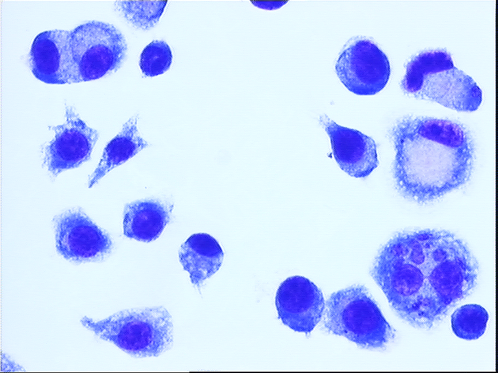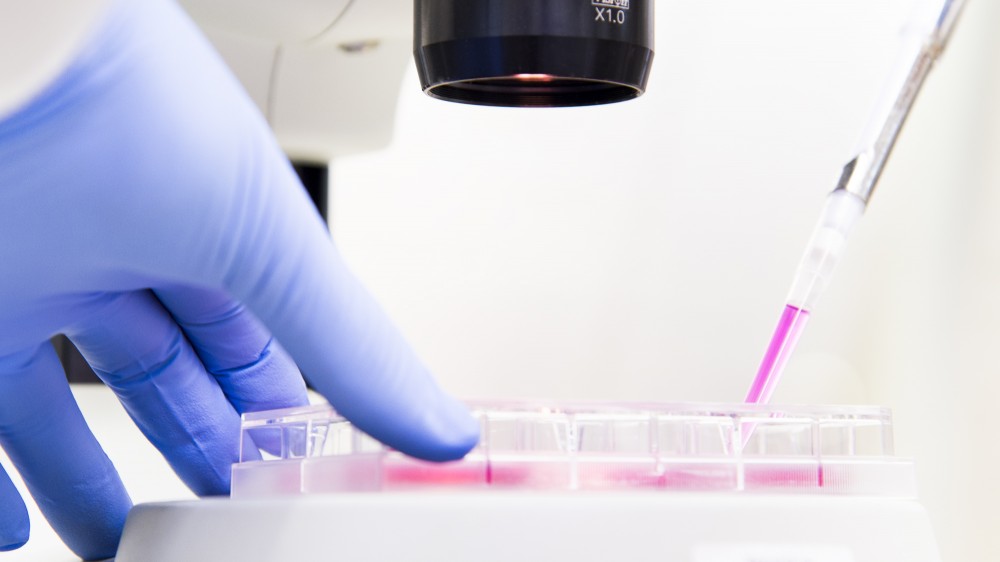The lung’s first line of defence
Dr Gyorgy Fejer was awarded funding to transfer skills and protocols to establish alveolar macrophage cell lines replacing the need to isolate cells from mouse organs or bone marrow.
Macrophages are phagocytic immune cells found in nearly all tissues that provide part of the body’s first line of defence against pathogens. Depending on their anatomical location, macrophages have distinct biological properties specific to the tissue type they reside in. This includes the distribution of receptors on the cell surface and cytokines produced in response to pathogens. Research is ongoing on the role of macrophages in infection and allergies. Typically to perform these studies macrophages are isolated from mice but as the cells have a limited life span, animals are continually required to harvest cells for experiments. Transformed macrophage cell lines do exist but these often lose key macrophage functions limiting their potential to replace the use of cells sourced from mice.
3Rs benefits
In 2013, Gyorgy published a method to establish continuously growing non-transformed macrophages (MPI cells) from mice without chemical or viral mutagenesis or genetic manipulation. Macrophages are typically isolated from terminally anaesthetised mice with around 300,000 cells isolated from one animal. In comparison, Gyorgy’s method enables over 30 million cells to be harvested from one tissue flask. This replaces approximately 100 mice a year in Gyorgy’s laboratory. The replacement potential for this method was highly commended in the 2014 International 3Rs Prize.
MPI cells are established from murine foetal livers but can also be established from livers up to two weeks after birth. The isolated liver cell suspension containing macrophage precursor cells is supplemented with GM-CSF, a cytokine that promotes cell development, maturation and survival in vitro, which results in adherent MPI cells after six to eight weeks of culture. MPI cells share a number of properties with alveolar macrophages and, unlike other types of primary macrophages, can be propagated indefinitely in culture and be genetically manipulated.

Scientific and technological benefits
Alveolar macrophages can be the first cells to encounter a respiratory bacterial or viral pathogen so studying their response to pathogens is important to understand infectious disease and develop new treatment options. The MPI cells are sensitive to respiratory pathogens making them amenable for these studies furthering the potential for replacing animals. Gyorgy was awarded an NC3Rs Pilot study grant to demonstrate the utility of MPI cells in infection studies, specifically investigating adenovirus, an important virus in vaccinations against infectious disease. Macrophage subtypes have differing susceptibility to adenoviruses and using the MPI cells Gyorgy demonstrated this was due to scavenger receptor SR-A6, MARCO.
Gyorgy is now training researchers at King’s College London (KCL) and the Tuberculosis Research Laboratory at Institut Pasteur in Korea (IPK) through an NC3Rs Skills and Knowledge Transfer grant. This award aims to build confidence in using MPI cells in further infection research areas deriving cell lines from transgenic mice lacking bacterial pathogen recognition sensors. Dr Matthew Chung and Dr Subhankar Mukhopadhyay at KCL are investigating the role of scavenger receptors in bacterial infection. They have developed three new cell lines that they are characterising in functional studies to understand how scavenger receptors impact phagocytosis.
Members of Dr Vincent Delorme’s laboratory at IPK have generated four new cell lines to date, including lines with fluorescent reporters. Work is ongoing to characterise these new cell lines, including establishing new co-culture methods to determine how alveolar macrophages impact other lung cells during infection.
Added value
The expertise and knowledge developed through Gyorgy’s NC3Rs awards has also been applied to new species, developing a porcine alveolar macrophage cell line. Through a BBSRC Project grant awarded to Dr Linda Dixon, these cells are now being used to investigate African swine fever virus virulence factors and also to develop a new vaccine in collaboration with veterinary vaccine company, Zoetis.
Further details of this Skills and Knowledge Transfer award including application abstract and publications.

